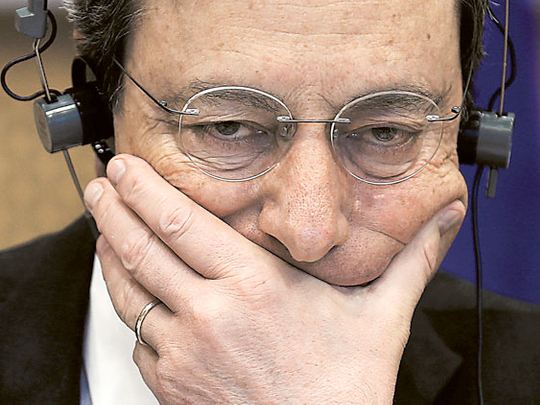
Brussels:The European Central Bank stepped up pressure yesterday for a joint fund to guarantee bank deposits in the Eurozone, saying Europe needed news tools to fight bank runs as the bloc’s debt crisis drives investors to flee risk.
The European Commission’s top economic official, Olli Rehn, warned the single currency area could disintegrate without stronger crisis-fighting measures and tough fiscal discipline.
The twin warnings came as worries about Spain’s banks and Greece’s survival in the euro area pushed the euro to a two-year low against the dollar and hastened a rush into safe-haven assets including Austrian and French bonds.
Irish voters seemed set in a referendum to approve a European budget discipline treaty vital to continue receiving EU financial aid. But the outcome of a second Greek general election on June 17, seen as crucial for Athens’ future in the currency zone, is too close to call.
ECB President Mario Draghi urged Europe’s leaders to clarify their vision for the single currency quickly or risk disaster, warning the European Parliament that the central bank could not fill the policy vacuum.
“We will avoid bank runs from solvent banks. Depositors’ money will be protected if we build this European guaranteed deposit fund. This will assure that depositors will be protected,” Draghi said, calling for an EU-wide banking supervision and resolution system.
EU paymaster Germany, reluctant to risk more of its own taxpayers’ money in support of Eurozone partners, has so far rejected any such joint deposit guarantee.
“The financial crisis has heightened risk aversion in a dramatic way,” Draghi said.
“I urge all governments to keep this in mind, because it is better to err by too much in the very beginning rather than by too little,” he said.
Another ECB policymaker, Bank of Italy governor Ignazio Visco, went further, saying political inertia and bad economic decisions had put “the entire European edifice” at risk and only a clear path to political union could save the euro.
“There are now growing doubts among international investors about governments’ cohesion in guiding the reform of European governance and even their ability to ensure the survival of the single currency,” Visco told the Bank of Italy’s annual meeting.
Global investors retreated sharply from equities in May and held more cash than at any stage since the crisis erupted in early 2010, Reuters’ asset allocation polls showed.
EU Economic and Monetary Affairs Commissioner Rehn, speaking at a Brussels conference, said Europe needed both tighter budget discipline and more integrated rescue funds to avert a potential breakup of the euro.
“We need a genuine stability culture and a much upgraded common capacity to contain common contagion,” he said. “This is the case, at least if we want to avoid a disintegration of the euro zone and instead make the euro succeed.”
The dramatic tone of EU and ECB officials raises pressure on Germany to drop its opposition to bolder rescue measures ahead of a June 28-29 summit that could be a turning point in the Eurozone crisis.
Spanish bond yields traded at 6.66 per cent, close to euro era highs, due to market expectations that Spain may need international help to keep its troubled banks afloat — a prospect flatly rejected by Prime Minister Mariano Rajoy.
“The levels are definitely worrying. Spain is reaching zones where it is harder and harder to finance itself in the capital market,” said Viola Julien, fixed income analyst at Helaba Landesbank Hesse-Thueringen.
“One can remember Portugal or Ireland when they went above the 7 per cent mark, they had to seek shelter in these [Eurozone] rescue funds and market participants are playing this scenario right now,” she said.
The uncertainty over Spain, the Eurozone’s fourth biggest economy, is making it harder for other member states to overcome their own debt problems, despite rigorous austerity programmes and structural reforms.
Italian Prime Minister Mario Monti said his country was threatened by “huge possibilities” of contagion, and pressure from rising sovereign bond yields could complicate reforms.












